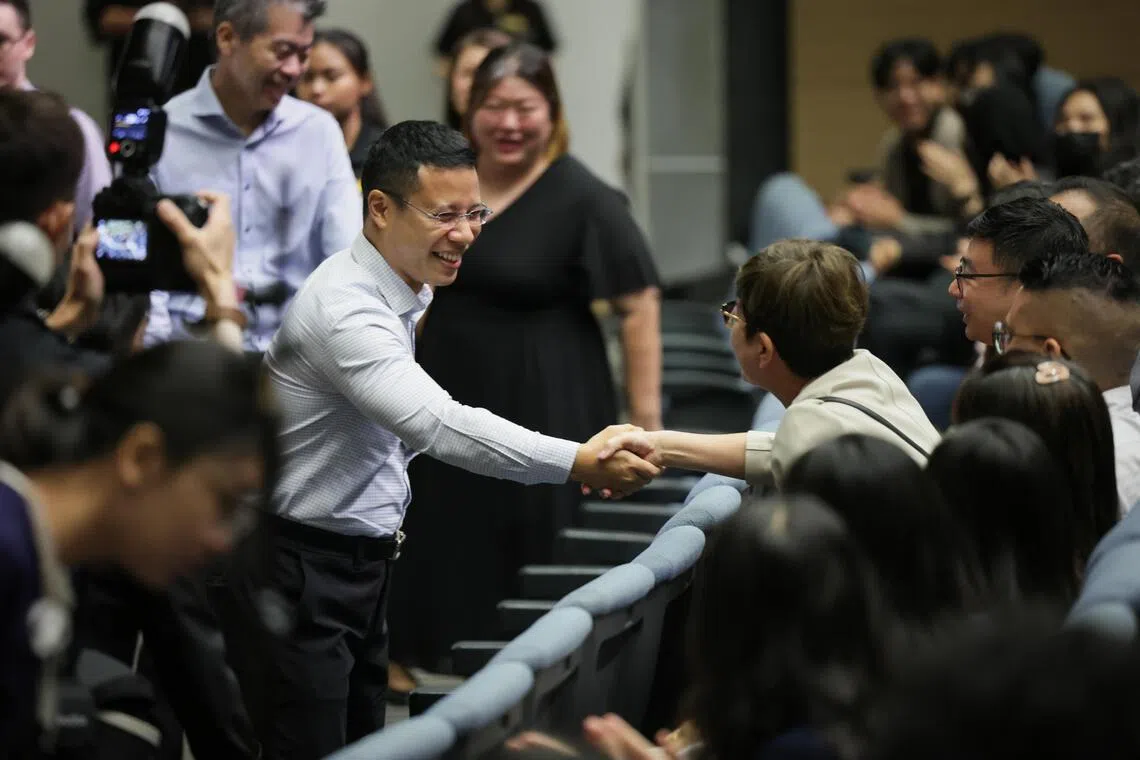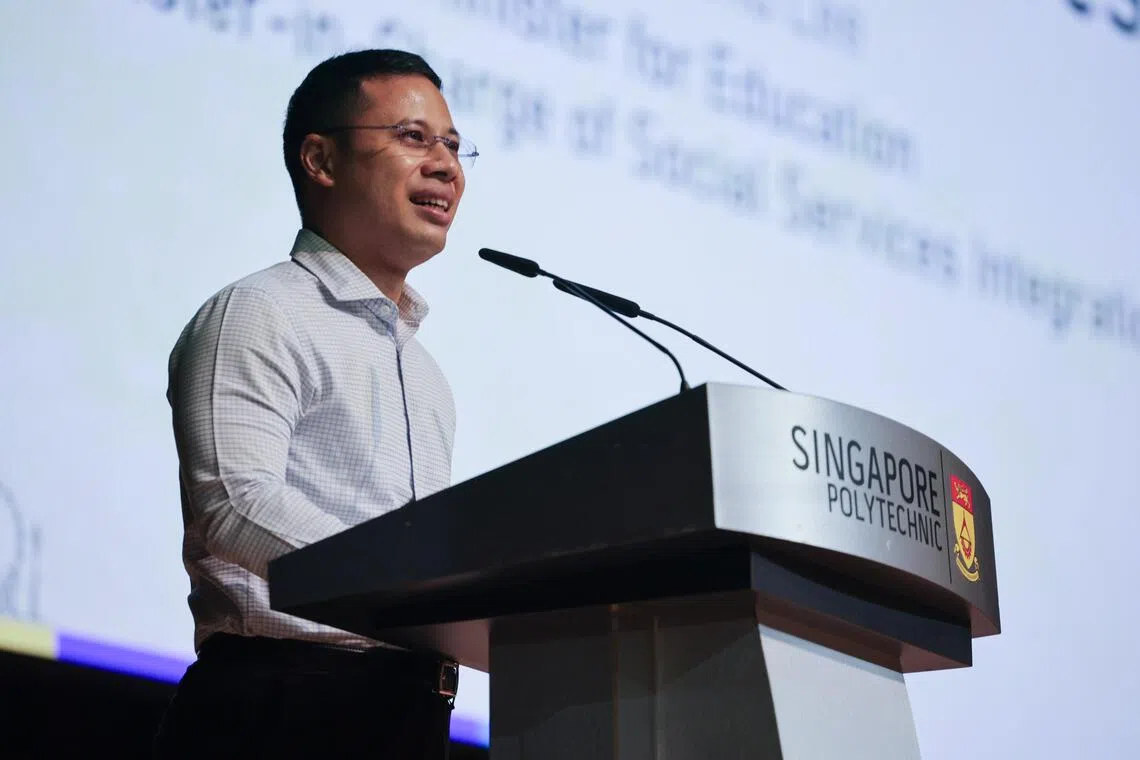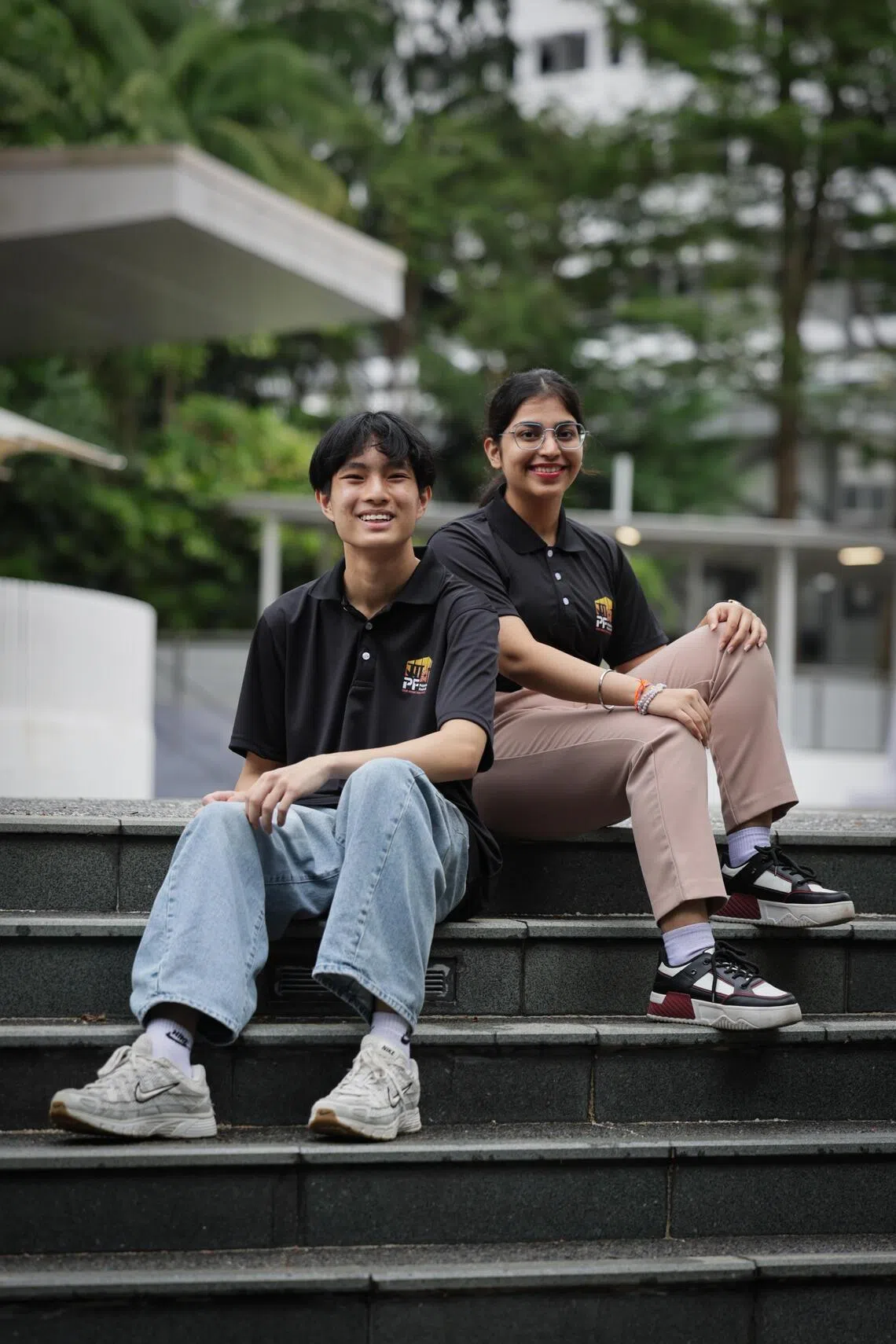Be bold and innovative in envisioning S’pore’s future: Desmond Lee to poly students
Sign up now: Get tips on how to help your child succeed

Education Minister Desmond Lee interacting with an attendee at Polytechnic Forum 2025, held at the Singapore Polytechnic Convention Centre on Sept 15.
ST PHOTO: GIN TAY
- Minister Desmond Lee urged polytechnic students to be innovative and address complex issues at the Polytechnic Forum 2025, focusing on Singapore's future.
- The forum addressed key challenges like geopolitics, ageing population, AI advancements, and climate change, requiring continuous upskilling and adaptation.
- Students expressed concerns about job prospects amid AI advancements but were encouraged by the advice to embrace life-long learning and adaptability.
AI generated
SINGAPORE - Polytechnic students are encouraged to try to solve national issues amid geopolitical and economic pressures, an ageing population, as well as technological and climate changes.
In envisioning Singapore’s future, they should be bold and innovative, while keeping their feet firmly planted on the ground and continuing to pick up new skills, said Education Minister Desmond Lee.
“There will... be opportunities for you to wrestle with the trade-offs as you try to solve complex national issues,” said Mr Lee, as he asked students to imagine what education will look like in the future and how life in the city-state can be reimagined.
He made these remarks on Sept 15 in his first appearance as Education Minister at the opening ceremony of Polytechnic Forum 2025, held at Singapore Polytechnic (SP).
Speaking to about 500 student leaders from the five polytechnics in Singapore at the SP Convention Centre, Mr Lee encouraged them to discuss fresh insights and perspectives on what can be done to improve Singapore.
The forum, which runs until Sept 19, is an annual event held since 1996 for participants to engage with national issues through dialogue, learning journeys and activities alongside government and industry leaders.
This year’s theme, Our Home Our Singapore, which celebrates six decades of nation-building, asks students to reimagine Singapore as a “Next Gen” city.
The theme in 2024 was Total Defence and the year before that, Green Singapore. In 2022, students discussed how to build a more caring and inclusive society.

Education Minister Desmond Lee delivering his speech during Polytechnic Forum 2025 at the Singapore Polytechnic Convention Centre on Sept 15, 2025.
ST PHOTO: GIN TAY
Looking ahead to SG100 and beyond, Mr Lee told the students that it will soon be their generation’s turn to lead Singapore in a time of flux. There are four new pressing issues they will need to tackle as future leaders, he added: The impact of geopolitical and economic pressures on Singapore and its way of life, an ageing population, technological advancements, and climate change.
Of the four challenges, rapid advancements in artificial intelligence (AI) and technology, and their impact on jobs, resonated most strongly with the students.
Calling AI both incredibly transformative and extremely disruptive, Mr Lee said that as repetitive jobs become automated or assisted by AI, humans are pushed towards higher-order tasks such as judgment, cross-disciplinary thinking and creativity.
“This means that demand for new skills will grow every day, and we have to keep upskilling and reskilling ourselves to keep up with these changes. So, the question is, what do we need to do to disrupt ourselves so that we do not get disrupted by others?”
SP information technology student Suhani Arora, 18, who is in her second year, said this point resonated with her the most.
“My personal concern is what will happen when I graduate after pursuing this diploma. One major concern right now in the technology market would definitely be being able to get a job in this sector,” she said.
Emphasising the importance of lifelong learning, Mr Lee reminded students that their education does not end after graduation.
While a polytechnic education will equip them with industry-ready skills, he said what will set them up for success in this fast-changing world is the ability to build on that strong base and keep picking up new skills.
“Whether it is taking on a new course outside your field of study, learning a new digital tool or picking up soft skills, the future belongs to those who embrace lifelong learning to seize opportunities,” said Mr Lee.
He also advised students to build a strong set of values during their formative years to mould their characters to contribute to the wider society.
“While your skills and academic qualifications may get you through the door, it is your attitude, interpersonal skills and values, such as your compassion, integrity, work ethic, that will determine how far you go,” he said, adding that this extends to how they treat those around them.
Mr Richard Li, 18, a second-year electronic and computer engineering student at Ngee Ann Polytechnic, said that while he shares Miss Arora’s concerns about job prospects upon graduation, he is encouraged by Minister Lee’s advice on lifelong learning.
“There are many things to learn right now... To get better job opportunities, it is better to be well-equipped with more skills. Because knowledge is not something you can buy,” Mr Li said.
“With artificial intelligence now, it is harder to find jobs as it is replacing a lot of manpower. We all know humans are not as capable as artificial intelligence to a certain extent, so we just have to find a way to co-exist,” he added.

Ngee Ann Polytechnic student Richard Li and Singapore Polytechnic student Suhani Arora at Polytechnic Forum 2025, held at the Singapore Polytechnic Convention Centre on Sept 15.
ST PHOTO: GIN TAY
Regarding the geopolitical situation, Mr Lee said Singapore, as a small and open city-state which relies on the free flow of international trade, is very much affected by global developments such as the ongoing economic tariffs and the rising tensions between the United States and China.
He called this “a broader shift towards protectionism and a retreat from multilateral trade norms”.
That said, he reminded students that there are still opportunities for businesses to develop innovative solutions, optimise processes and reduce costs.
“So, don’t just think about surviving in this new environment. Think how all of us in Singapore can thrive. How should we pivot, and what should our new economic blueprint look like, so that we can thrive and survive in this new epoch that is unfolding as we speak.”
Another challenge is that Singapore has one of the fastest ageing societies
“Singapore’s core labour force may decline, which may undermine our economic growth trajectory,” Mr Lee said.
This demographic shift means increased pressure on healthcare, eldercare, and the built environment and construction sectors.
Addressing the last challenge of climate change, Mr Lee said Singapore is particularly vulnerable to its existential threats.
Citing how rising sea levels affect low-lying areas which cover 30 per cent of the island, he said: “Our survival as Singapore depends on our ability to marshal and work with partners to tackle climate change. But also to adapt to the fast-changing climate.”
Unpredictable weather conditions also affect water and food security, Mr Lee said – if climate change affects the harvests in countries that export food here, they may rethink sending food to Singapore in order to meet the needs of their own people.
“So, the question we might want to think of over the next five days is, what should we do to minimise the effects of climate change and ensure a liveable environment for us, and for generations to come.”
Correction note: In an earlier version of the story, we said that Singapore is becoming one of the fastest ageing societies in the world by 2031, instead of 2030. This has been corrected. We have also updated the story to reflect that Singapore is already one of the fastest ageing societies in the world.



